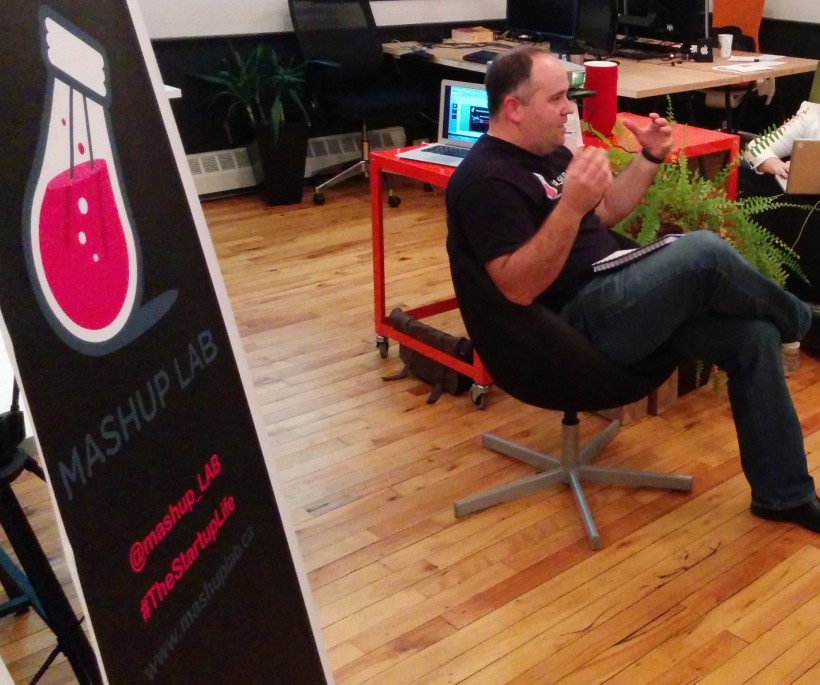Andrew Button has attended too many meetings about Atlantic Canada’s economic troubles. He has worked in economic development with a specialization in rural communities and found that the region’s economic woes became a hot topic in every discussion.
Yet these constant meetings never found concrete solutions to grow economic development in Atlantic Canada.
“Who was actually going to do this work in these communities to inspire more entrepreneurial activity—that was always left as a question mark for me,” said Button, who spent two years at the Lunenburg Queens Regional Development Agency . “So finally I got fed up and said, hell, I can do something.”
And so, Button created Mashup Lab, holding the first meeting in Mahone Bay in May 2014.
Mashup Lab aims to bring rural and small-town entrepreneurs together in their own communities, rather than forcing them to migrate to urban centres, such as Halifax, Toronto or Montreal.
The organization hosts an event every six weeks so potential entrepreneurs in places like Mahone Bay, Yarmouth or Cape Breton can surround themselves with like-minded people. Past events have been nights devoted to business pitches or lectures by current startup entrepreneurs.
On Sept. 30, Button said he decided to do the most audacious thing he’s ever done in his life: create Mashup Weekend, an event in which people can share ideas and turn them into startups over one weekend. It was audacious because the startup weekend model is usually practised in urban centres, and in one place. Button wanted it happening in several places.
In November, just two months later, Mashup Weekend occurred simultaneously in Yarmouth, Bridgewater and Kentville.
Button said 10 to 20 people showed up. The small number of people at the three locations allowed mentors to work intimately with one team rather than having to manage four teams, as often happens at similar events.
Matt Hall was a mentor at the event, where he helped a team create a feasible plan for a startup by the end of the weekend.
“People come wanting to have a good time and with relatively low expectations of tangible outcomes,” said Hall, who is a cofounder of Agile Geoscience, a geoscience consulting company. He is alsoa co-founder of The Hub South Shore, a co-working space.
“…What blows everybody away is that actually you can get an amazing amount of real work and real insight done over a weekend—especially working with total strangers.”
Hall moved to Mahone Bay after working for a Calgary oil company for 10 years. He said he expected to find a bunch of retirees in Mahone Bay, and was surprised to find people with an entrepreneurial spirit, like Button, living in the community.
“Finding these amazing people living in places like Port Mouton and Blue Rock and Clare -- they had networks like you wouldn’t believe, had done some amazing things,” Button said. “And for whatever reason, [they] found themselves in these small communities in Nova Scotia. It was like this completely untapped resource that was sitting here.” That was what happened to Suman Kalyan, co-founder of customer data analytics company Adroit Vista.
Kalyan moved from Toronto to Mahone Bay because of his wife’s new job.
In Toronto, he had worked as a data analyst for companies like Rogers and Telus.
“I was very comfortable in a big company,” Kalyan said. “Running sales, marketing, that was all taken care of.”
But when starting Adroit Vista, Kalyan realized he had little experience in areas like sales and marketing—he had only analyzed data. And though Kalyan had networks in Toronto and Europe, he didn’t have one on the South Shore of Nova Scotia.
Button and Kalyan met at The Hub South Shore. Button advised Kalyan on creating a feasible business model, and gave him tips on how to manage sales and marketing effectively. Kalyan then attended Mashup Lab events and met other entrepreneurs whom he also asked about running a business.
“Andrew’s been a champion for us,” Kalyan said.
Kalyan’s come so far with Adroit Vista that in March he will be a speaker at a Mashup Lab Lightening Talk, in which Nova Scotian startup founders discuss their experiences in setting up and running businesses.
Though Button has created many successful events, he admits that his business model isn’t ideal. Right now, Mashup Lab depends on corporate sponsorship. The sponsorship money covers event expenses, but Button doesn’t make a profit, despite Mashup Lab being a for-profit company.
However, Button said his goal right now is just to cover the cost of expenses. He makes a living through consulting companies about their economic development.
With Mashup Lab, Button said he not only wants to create many businesses in rural Nova Scotia, but to create ones that are sustainable. He admits that Mashup Lab’s business model of corporate sponsorship isn’t sustainable and is trying to discover a structure that would last.
“I felt like there was a real opportunity for us to understand how we build sustainable business models around this type of activity,” Button said, “because I feel like that’s the only way we’re going to get amplified, accelerated, sustainable growth.”
Button said he wants to expose more Nova Scotians to the feasibility of creating their own startups. Mashup Lab is in talks to collaborate with other Nova Scotian entrepreneurial organizations.
“The more activity we have in this entrepreneurial startup space in rural areas, the better,” Button said. “I can only do so much. … We need to be doing ten times more than what I can do.”
This article first appeared in the latest edition of Entrevestor Intelligence.
Disclaimer: Entrevestor receives financial support from government agencies that support startup companies in Atlantic Canada. The sponsoring agencies play no role in determining which companies and individuals are featured in this column, nor do they review columns before they are published.










